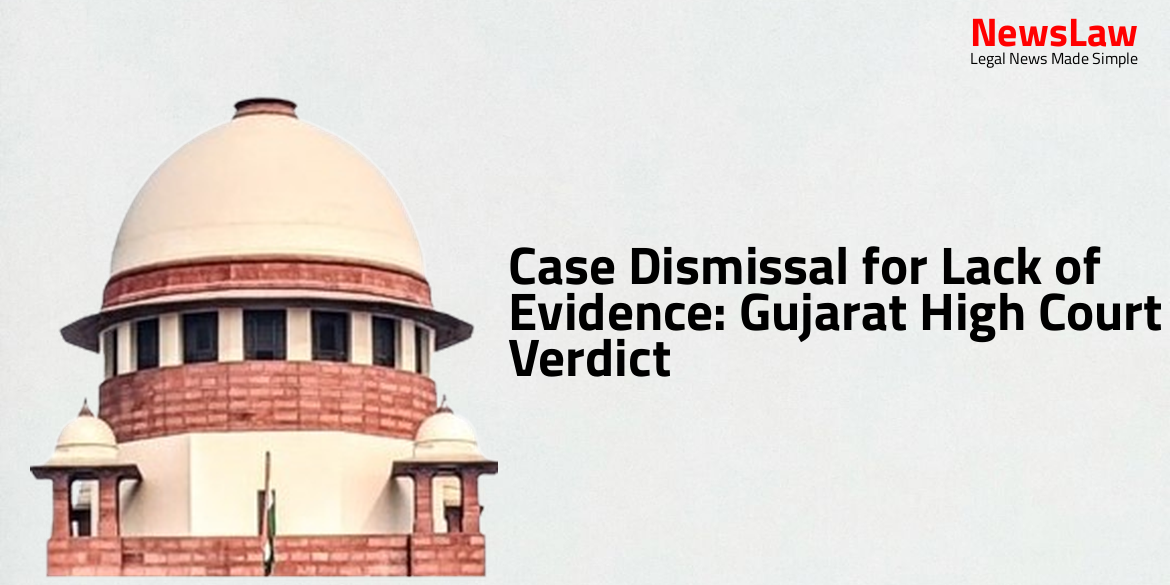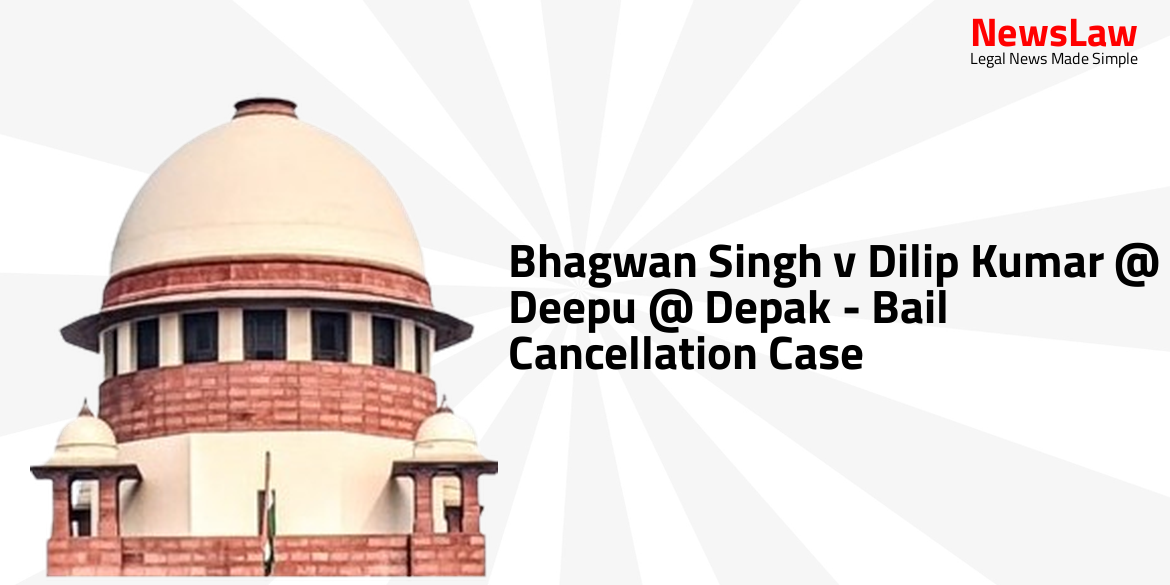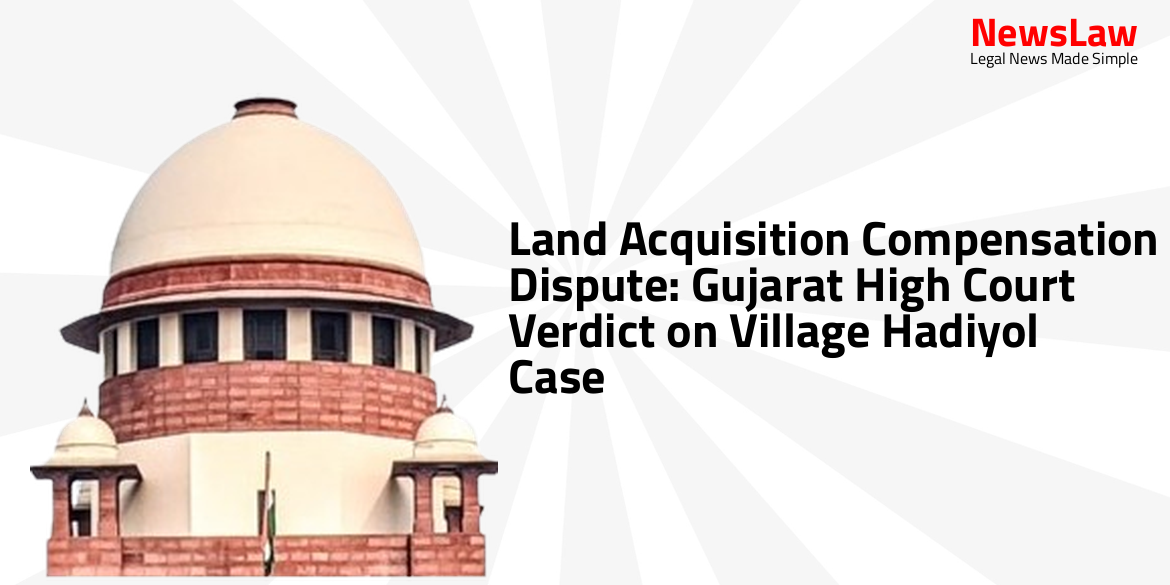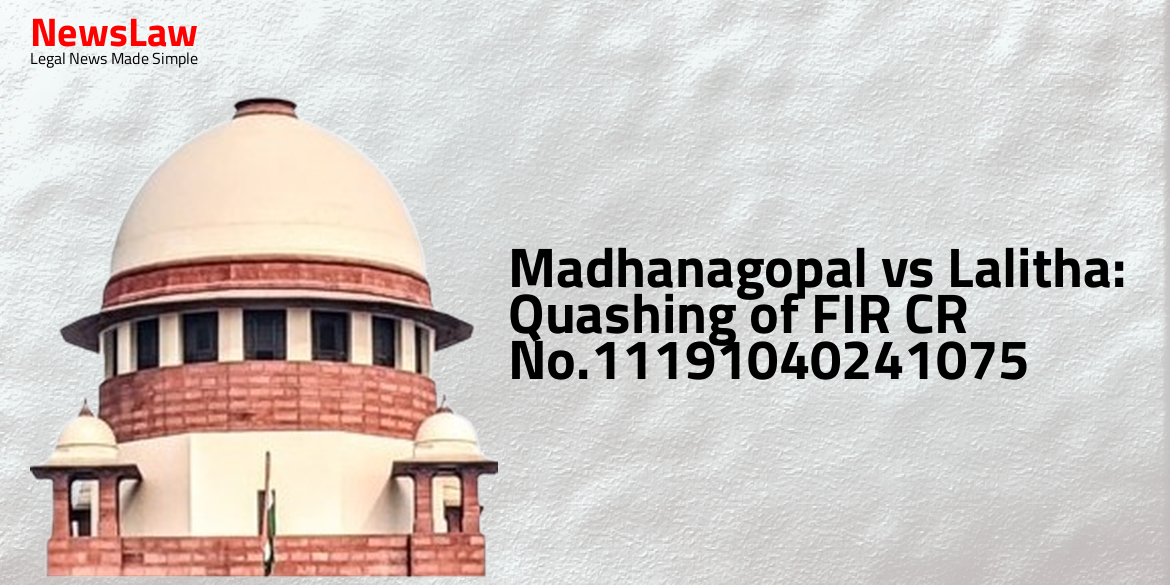In a recent ruling by the Gujarat High Court, a case was dismissed for lack of evidence. The Court’s verdict sheds light on the importance of strong evidence in legal proceedings. Stay informed about this crucial development in the case.
Facts
- Coordinate Bench of the Court dismissed Criminal Misc. Applications on 28.06.2023 and 12.07.2023.
- The FIR was not quashed by the Coordinate Bench’s judgment, confirmed by the Supreme Court.
- Additional Sessions Judge in Mehsana refused to discharge the accused under Sections 306, 498A, and 114 of IPC.
- SLP (Criminal) No.9461 of 2023 taken to the Supreme Court was not admitted and withdrawn.
- Petitioners were advised to seek other available remedies under the law, specifically in Cr.P.C. before the Trial Court or any other forum.
- Petitioner No.1 and his deceased wife were married in 2009.
- They had a child named Kanji during their marriage.
- Previous quashing petitions were filed by the petitioners and disposed of by the court.
- A subsequent SLP (Criminal) was filed before the Supreme Court, which was later withdrawn by the petitioners.
- The application for discharge of the offence before the Sessions Judge was rejected.
- On 18.04.2024, the deceased committed suicide, allegedly due to physical and mental cruelty by the petitioners.
- Accused petitioners were alleged to have sold the deceased’s gold ornaments.
- An FIR was filed against the petitioners, and the case was committed to the Sessions Court.
Arguments
- ARG_PETITIONER: The Senior Advocate representing the petitioner argues that the charge-sheet papers only indicate a general allegation of physical and mental torture by the accused, not sufficient evidence of continuous harassment leading to suicide.
- Refers to the Naresh Kumar vs State of Haryana case to emphasize that mere harassment does not imply continuous harassment leading to suicide.
- Critiques the Sessions Court for not considering the discharge application from a legal viewpoint, highlighting a failure to address the arguments and evidence presented.
- Cites the P. Vijayan vs State of Kerala case to point out the need for strong suspicion against the accused for discharge under Section 227 of the Cr.P.C.
- Emphasizes the mysterious and varied reasons for suicide, and states that suicide cannot be directly attributed to the accused without positive evidence.
- Mentions the wide scope of the Court under Section 482 of Cr.P.C. to correct legal errors and points out previous unsuccessful attempts at quashing petitions.
- At the time of framing the charge, the Court is not required to assess the evidence for conviction beyond reasonable doubt.
- The availability of prima facie evidence in the charge-sheet papers is sufficient for the Court to frame charges and commence trial.
- The statements of witnesses found in the charge-sheet create a strong suspicion against the accused.
Analysis
- Section 227 of the Cr.P.C. states that the Judge shall discharge the accused if there is not sufficient ground for proceeding against the accused.
- If the Magistrate finds ground for presuming that the accused has committed an offense under Chapter XXI of the Code within the Magistrate’s competence, he must frame a charge against the accused.
- Section 239 mandates a careful consideration of whether the charge against the accused is groundless or if there is ground for presuming that he has committed an offense.
- The power to discharge under Section 245(1) is to be exercised when the Magistrate considers, for reasons to be recorded, that no case against the accused has been made out which would warrant his conviction.
- Sections 227 and 239 require the consideration for discharge or framing of charges to be based on the case record, documents, oral hearings, and examination of the accused after hearing both sides.
- The Court, while considering the question of framing charges, has the power to sift and weigh the evidence to determine if a prima facie case against the accused has been established.
- The Court must proceed on the assumption that the material brought by the prosecution is true and evaluate if the facts emerging from the material disclose the necessary ingredients to constitute the offense.
- The responsibility of framing charges lies with the Court, and it should not act merely as a post office or mouthpiece of the prosecution.
- At the stage of framing charges, the Court should not conduct a roving inquiry into the pros and cons of the matter or weigh the evidence as in a trial.
- The Court is not required to determine the reliability or sufficiency of the evidence to proceed further; if no case is made out based on the facts and documents produced by the prosecution, the proceedings against the accused should be dropped or quashed.
- The process of framing charges does not require proof but relies on establishing a prima facie case.
- The trial judge must discharge the accused if there is not sufficient grounds for proceeding against them.
- Discharge of the accused can occur under different sections based on the type of case.
- The court evaluates the evidence without delving into its probative value but focusing on the theory of probable consequence.
- The court frames charges if a prima facie case is made out.
- Discharge is possible if the material is groundless and doesn’t even make out a case; otherwise, charges are framed.
- The Court considers whether there is sufficient material to proceed against the accused during the framing of charges.
- The evaluation of evidence at this stage is not required, and the material provided by the prosecution is taken as true.
- The court must have a strong suspicion based on material to frame charges, not just rely on prosecuting authorities.
- The word ‘groundless’ means there is no basis for presuming the accused has committed an offense.
- The Court is not expected to marshal the records with a view to decide admissibility and reliability of the documents or records, but to form an opinion prima facie.
- The learned advocate for the petitioners failed to provide material proving that no case is made out to frame charges against the accused.
- No material was presented that was patently absurd or inherently improbable to lead to the conclusion that no charge should be framed.
- The Court found no case in favor of the petitioners based on the available material.
- The order is well-reasoned within the scope of Section 227 of the Cr.P.C., where the Sessions Judge established a strong suspicion against the accused to possibly lead to framing charges.
- The revision lacks merit and appears to be another attempt to prolong the trial.
Decision
- The present revision has been dismissed for the reasons stated above.
Case Title: JAYDEEPSING PRAVINSINH CHAVDA Vs. STATE OF GUJARAT
Case Number: R/CR.RA/536/2024



